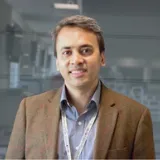Please note: this event has passed
You can register for this Inaugural Lecture on Eventbrite.
Join us to celebrate a special milestone for our new professors and hear about their inspiring career journeys. Doors for this event will open on 16:45 (BST), with the lectures to commence at 16:50. A drinks reception will be held at 18:00 immediately after the lecture.
Professor Pablo Lamata
Digital twins unveiling central blood pressure
Abstract
The digital twin of the heart, its computational replica, is one of the pillars to enable the vision of precision cardiology. Scientific progress is today supported by the computer-enhanced ability to find the hidden patterns in observations (induction) and to infer predictions from our mechanistic understanding (deduction). This progress translates into better diagnosis and prognosis in the management of cardiovascular disease. This lecture introduces these concepts and illustrates them in the quest for the non-invasive and universal access to central blood pressure. The combination of imaging and modelling enables the estimation of the extra burden caused by an obstruction with unprecedented detail and insights, the discovery of organ remodelling signatures that infer the presence of hypertension or even its aetiology, or the ability to sense pressure remotely.
Biography
Pablo Lamata was born in Soria, Spain. He received his Telecommunications Engineering and MSc degrees from the Universidad de Zaragoza (2002), and his PhD in Biomedical Engineering from the Unviersidad Politécnica de Madrid (2006). He spent two years in industry, as a Marie Curie Fellow at Siemens in Oxford, where he developed the Resection Map for hepatic surgical procedures. In 2009 he joined the University of Oxford and started working in the field of Computational Cardiology. In 2012 he moved to King’s College of London where he obtained a Sir Henry Dale Fellowship (2013) and a Wellcome Senior Research Fellowship (2018). He led the EU consortium "Personalised In-Silico Cardiology” (2017-2022) that has shaped how digital twin technologies enable the vision of precision cardiology.
Professor Miraz Rahman
Innovations in drug discovery: from cancer to infectious disease
Abstract
It is so much fun to design compounds and see how they behave when challenged within a biological system. I originally trained as a cancer chemist and worked on discovering new DNA-targeted anti-cancer drugs with some success. After co-founding two spinouts in the oncology area, I shifted my interest to antimicrobial drug discovery to play a part in tacking the rising challenges associated with antimicrobial resistance. I found allies at UK Health Security Agency and other UK universities, and we did some innovative science to develop a few candidate antimicrobials. It was a lot of fun but we had no success in attracting investment to develop these new antimicrobials. I will talk about my personal journey and the realities of translational drug discovery in two disease areas with vastly different commercial outlook.
Biography
I graduated as a pharmacist from the University of Dhaka, Bangladesh in 1997 and started my career as an industrial R&D pharmacist. I moved to London in 2005 to study for a PhD in medicinal chemistry at The School of Pharmacy (now part of UCL) with Professor David Thurston. After four years postdoctoral training at UCL in anticancer drug discovery, I joined King’s in 2012 as a lecturer. My research lab focuses on the application of computational chemistry, medicinal chemistry and chemical biology techniques to the design, synthesis, and evaluation of drug-like chemical scaffolds as anticancer and anti-infective agents. I am a drug discovery scientist with an entrepreneurial spirit and co-founded oncology spinouts Transcriptogen in 2013, Femtogenix (now Pheon Therapeutics) in 2015 and recently the antibiotic company Necobiotix in 2020.
Event details
Lecture Theatre 1New Hunt’s House
Great Maze Pond, London, SE1 9RT


